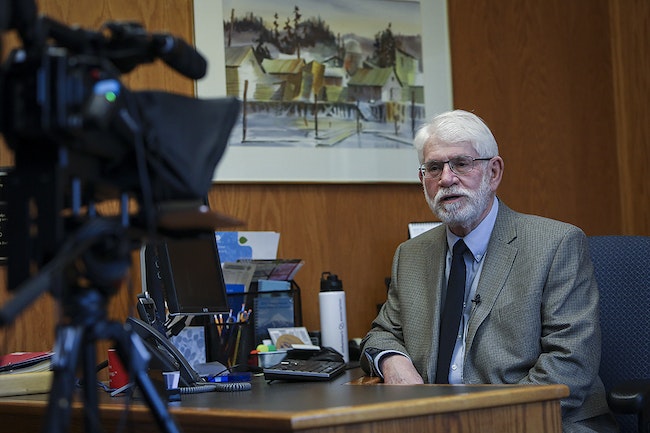
Salem Mayor Chuck Bennett films a video acceptance for a literacy award on Thursday, April 9. (Amanda Loman/Salem Reporter)
Salem has emerged from a year of fire, ice, pandemic and protest with much to be proud of, Mayor Chuck Bennett told residents during his State of the City address Wednesday.
While Salem has been hammered by natural disaster after natural disaster, Bennett touched on the positives the city has been working toward or has seen in the last year.
For the second year in a row, homelessness dominated the mayor’s talking points in his hourlong address.
Homelessness
While Bennett spent some of last year’s speech urging the Salem City Council to pass an ordinance that would ban sitting or lying on the sidewalks during most of the day, this year he highlighted investments the city has made in housing projects and asked for state funding for future social service projects.
“Over the past several years, homelessness and its impacts has replaced by far any other issue on the public’s mind. No wonder. It’s disturbing on a basic humanitarian level to see our fellow residents living in what can be degrading, unsafe, unsanitary and deeply unfortunate conditions,” he said.
Bennett said Marion County in 2019 saw a 20% jump in the reported number of people experiencing homelessness, from 1,218 people to 1,422. He said social service agencies expect that number will rise by another 100 to 300 people this year.
He urged the state to provide $1 million to cover the two-year operating costs for a sobering center and $5 million to cover operational costs of a proposed “navigation center.” The facility would be open 24 hours a day to help people find aid with housing or other more immediate basic needs, such as toilets or potable water.
Bennett also said the city needed to look toward a mobile response unit that would respond to low-level 911 calls of those in crisis with a medic and a crisis worker rather than police.
He said the city is looking at reducing the need to use Wallace Marine Park and Cascades Gateway Park as camping locations for the city’s unsheltered, which has been allowed because of Covid. A temporary campground opened at the Oregon State Fairgrounds in February
He said there’s a deep hope that there is some simple or universal solution to homelessness, but that silver bullet doesn’t exist and trying to tackle the problem will be costly.
“What you learn as you get very close to this on a public policy level is that there isn’t one thing in government that we can do to solve this problem. It’s truly an all hands-on deck, all resources concentrated at the local level on this situation. And the price tag is well beyond what we have seen invested into mental health, addiction, chronic health care, these needs and the truly affordable housing for every income level,” he said.
Bennett pointed to the city’s first ever permanent supportive housing project, Redwood Crossings, which opened last fall and provided 37 apartments to people who had been chronically homeless.
He also talked about the Homeless Rental Assistance Program which has housed more than 300 people since it launched in 2017.
Police
Salem was the scene of unprecedented protests over the summer, which resulted in an audit of the Salem Police Department’s procedures and practices. The police department came under fire for what was perceived as disparate treatment of armed individuals guarding a downtown business compared to unarmed Black Lives Matter protesters.
Bennett said the results of the audit are expected to be released in the coming weeks.
“The police had the unenviable job of balancing the competing interests of the public’s safety and individual constitutional rights. Our city has gotten through this period. In other communities it caused real wreckage, we’ve seen it in other towns in Oregon and nationally. We did it successfully because our police department did an outstanding job,” Bennett said.
He said it was a banner year for the Salem Police Department as it got a new police chief, Trevor Womack, in December and moved into its new headquarters on Division Street.
Water
Bennett talked about several upgrades to the city’s water treatment facility at Geren Island.
He mentioned concern about the watershed in the wake of the Beachie Creek and Lionshead Fires.
“There continues to be substantial concern about the impact of the fire on Salem’s North Santiam River water supply. Also of concern is a proposed sewer line for canyon communities that would also threaten the city’s drinking water,” he said.
Bennett said city is spending $25 million to reconstruct an aging sand filter at Geren Island, with another $20 million from the state. That work is expected to be complete in 2023.
A $14.5 million project which will install a new well at the water treatment facility that will augment peak water demands during the hot summer months is expected to be completed next spring.
Economy
Bennett pointed to several positive economic indicators, like an influx of building permits.
He said last year the city approved more building permits for multifamily housing, 770, than any year going back to at least 2012.
From July to December, 1,114 permits were issued at a value of more than $330 million. That’s spendier than the same time the year prior which saw 1,183 permits valued at $215 million.
Covid
Last year the city received $7.2 million in federal reimbursements for its response to the Covid pandemic, Bennett said.
Salem disbursed more than $250,000 to 55 businesses so they could buy temporary outdoor dining tents and heaters.
Have a tip? Contact reporter Saphara Harrell at 503-549-6250, [email protected].
Salem Reporter counts on community support to fund vital local journalism. You can help us do more.
SUBSCRIBE: A monthly digital subscription starts at $5 a month.
GIFT: Give someone you know a subscription.
ONE-TIME PAYMENT: Contribute, knowing your support goes towards more local journalism you can trust.









